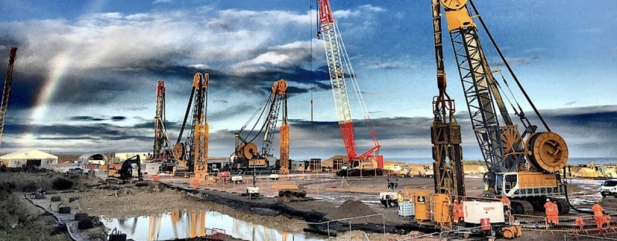Archived article
Please note that tax, investment, pension and ISA rules can change and the information and any views contained in this article may now be inaccurate.
Crunch time for Sirius Minerals as it tries to secure $3bn

With three years to go until the North Yorkshire-based Woodsmith potash mine starts production, it’s a long waiting game for the 25,000 shareholders in Sirius Minerals (SXX). However this period is likely to be far from uneventful.
Aside from successfully building the mine infrastructure, one of the biggest tests for investors is the ability for Sirius to secure stage 2 financing and that’s something on the schedule for later this year.
The FTSE 250 miner needs to raise up to $3bn which it hopes to secure entirely through debt. Commitment letters and proposals from banks have started to appear although Sirius’ June target to have everything in place has been missed.
Chief executive Chris Fraser says the only point at which Sirius would need to tap shareholders for more cash via issuing new shares would be if it couldn’t get the full $3bn in debt.
PLAN OF ACTION
The company intends to have binding commitment letters by the end of September. At this point it hopes to get support from the Infrastructure and Projects Authority (IPA) to cover any shortfall. This is a UK scheme offering a government-backed guarantee to help infrastructure projects access debt finance.
Sirius has already been pre-approved for IPA backing. ‘The IPA is the last piece of the jigsaw puzzle,’ says Fraser. ‘It only comes, if it comes, once they’ve seen the bank process.’
The UK guarantee scheme would see Sirius raise the necessary funds by issuing corporate bonds with a government guarantee attached, reducing the risk for bond investors to that of a gilt. The interest rate would match that agreed with the banking syndicate and the government would take the difference between the gilt and the coupon rate.
NEED FOR MORE OFFTAKES
Nothing is ever simple in the world of mining and investors should appreciate that the banking syndicate component of the debt finance is still dependent on Sirius achieving more offtake agreements. The financiers will want reassurance now that there are future buyers lined up for Sirius’ production.
‘We need more offtakes before the funding would be unconditional,’ confirms Fraser.
Sirius intends to extract polyhalite, a form of potash containing potassium, sulphur, magnesium and calcium, via underground mining.
It will then transport the material via a conveyor and crush and grind it to a fine powder, and then re-granulate it to Poly4 which is Sirius’ unique multi-nutrient fertiliser.
The company is targeting maiden polyhalite production in May 2021, ramping up to 10m tonnes a year by late 2024.
It hopes the product will be used by farmers to help improve crop yields. So far it has signed offtake agreements with a variety of parties including an agribusiness group, a fertiliser supplier and a peony seed oil producer.
Importantly, none of the offtake deals so far have been structured so Sirius gets the market price at the time of delivery. ‘Each agreement has a different configuration. It is defined by the customer’s view, in a downsize scenario what would they have to compete against as a substitution? The price points of those products are how they derive the price they pay us,’ says the CEO.
Fraser adds that the first round of offtake deals were signed before Sirius had planning permission to build its mine. ‘That’s how keen they were for the product,’ he adds.
‘The value of polyhalite is always going to be the value the farmer is willing to pay. We can see where that will be in time – a $200 to $300 price point is where polyhalite could settle. That could be five to 10 years away.’
CHANGING BUYING HABITS
The agriculture industry has historically bought fertiliser for a single growing season. As such, Sirius faces the difficult task of getting potential buyers to think differently and agree to longer term supply deals.
‘There is no doubt that polyhalite does the job. That question has been answered for years. A lot of the discussion we’re having with potential customers is about the nature of the risk. Banks are trying to get us to transfer risk to the customer so they can model and understand the revenue side.’
Sirius believes its operating costs will be around $30 per tonne. Investment bank Liberum currently models a $125 per tonne achieved selling price by Sirius for the first seven years’ production. That suggests Sirius could make a decent profit margin, generating cash to rapidly pay down debt. Indeed, Liberum forecasts the business will be in a net cash position by 2028.
Fraser says he wants Sirius to start paying shareholder dividends before the company achieves a net cash position. ‘Efficient capital structures mean you don’t repay all the debt, you restructure it and create capacity to pay dividends as quickly as possible,’ comments the CEO.
Important information:
These articles are provided by Shares magazine which is published by AJ Bell Media, a part of AJ Bell. Shares is not written by AJ Bell.
Shares is provided for your general information and use and is not a personal recommendation to invest. It is not intended to be relied upon by you in making or not making any investment decisions. The investments referred to in these articles will not be suitable for all investors. If in doubt please seek appropriate independent financial advice.
Investors acting on the information in these articles do so at their own risk and AJ Bell Media and its staff do not accept liability for losses suffered by investors as a result of their investment decisions.

 magazine
magazine










